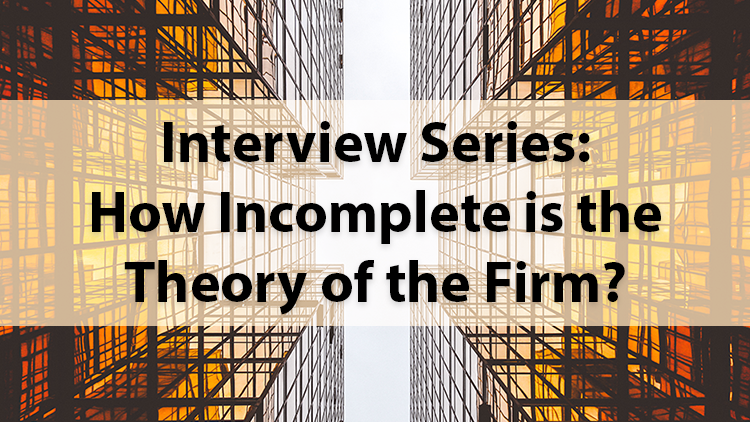The second installment in ProMarket’s new interview series: Should the economic theory of the firm be modified? If so, how? In this installment, we ask MIT’s John Van Reenen. “Since markets in the U.S. and other advanced countries have become increasingly concentrated in the hands of a smaller number of “superstar” firms, the ability of such firms to influence market rules has also strengthened.”
The standard (economic) theory of the firm is silent on the role firms can play in shaping the rules of the game under which they operate. In reality, many firms lobby politicians and try to capture regulators in order to modify the rules of the game in their favor. Some scholars have argued that the resources devoted to these activities are relatively so small that they are likely to have insignificant effects, and/or that regardless of how much firms invest in political activities, in a well-functioning democracy there are countervailing forces that effectively level the playing field. Other scholars have noted that the resources firms devote to shaping the rules of the game to their own advantage are sufficiently large and their effects sufficiently important to warrant a rethinking of the standard economic theory of the firm. Which of these two views has more empirical support? If the latter, should the economic theory of the firm be modified? If so, how, and is the potential fix better or worse than the existing problem?
To address these questions, the Stigler Center at the University of Chicago Booth School of Business, Harvard Business School, and Oxford University will organize a conference in Chicago on March 3–4, 2017.
The following interview with MIT professor John Van Reenen is part of an interview series with influential scholars who are addressing these issues in their work. You can read the first installment here.

John Van Reenen is a Professor of Applied Economics at the MIT Sloan School of Management. He is known for his research on the economics of innovation, labor markets, and productivity. In 2009 he was awarded the Yrjö Jahnsson Award, the European equivalent to the Bates Clark Medal in the U.S., awarded every two years to the best economist in Europe under the age of 45.
In a brief interview with ProMarket ahead of the upcoming conference on the theory of the firm, Van Reenen shared some thoughts on the role of corporations and government interference in the market.
Q: The neoclassical theory of the firm does not consider political engagement by corporations. How big of an omission do you think this is?
It’s an omission–large firms have to be (and are) aware of the political and legal environment they face. They are also involved with influencing that environment through lobbying, etc. This has always been the case in developing countries, some market economies (like Italy), and some industries with close government connections (like defense). Since markets in the U.S. and other advanced countries have become increasingly concentrated in the hands of a smaller number of “superstar” firms, the ability of such firms to influence market rules has also strengthened.
But I actually think that a bigger theoretical hole in our understanding of the politics of the firm is elsewhere. A first order empirical fact of economics is the enormous heterogeneity we see between firms in their productivity and management. Part of the reason for this is likely to be because of the difficulty of making efficiency improvements in companies that increase the size of the pie, but leave some groups worse off. The losers can block change as writers such as Cyert and March long emphasized. Since product markets are imperfectly competitive it takes a long time before such firms are driven out of business. Understanding the reasons for performance heterogeneity and its link to the political economy of the firm is a key omission.
Q: To what extent is political engagement by corporations responsible for the current populist discontent?
Hardly at all. It is a huge political failure that politicians have done little to deal with the extraordinary growth of inequality since the late 1970s. This—especially the polarization of the labor market and the stagnation of middle class incomes—has been the major structural cause of populist uprisings that are threatening the stability of the West. Maybe it is a “sin of omission” that corporations have not pushed more to deal with this, but above all it is a policy failure to sufficiently help those losing out from technology and globalization—through education, training, and income compensation via the welfare and social insurance systems.
Q: The World Economic Forum has called for “reimagining” and “reforming” capitalism. To what extent is this need for reform the result of disruption brought by technological change, globalization, and immigration and to what extent is it the effect of rent seeking and regulatory capture?
These forces for change via technological change, globalization, and immigration clearly place stresses on society—they always have. But they benefit us on average as they are forces that increase aggregate material wellbeing. The question is how are these benefits distributed? Governments have an important role to play in facilitating this change through helping people adapt (as noted in answer to question 2).
Q: Some people describe Donald Trump’s economic policies as “corporatism.” Are you more worried by Trump’s interference in the market economy or by companies’ ability to subvert markets’ rules?
I am far more worried by Trump. His approach is supportive of business not markets—he is corporatist in the sense that he can create headlines by bullying particular firms to create the appearance of bringing back jobs. Companies will invest more and more in marketing to do things that make him look good and performing actions that benefit his business interests in order to curry favor with him. Perhaps more importantly, he is undermining national (constitution, independent judiciary) and international rules (NATO, WTO, EU, etc.) that have enabled prosperous growth since the Second World War. Generating trade wars and military conflicts is the surest recipe for economic disaster.






